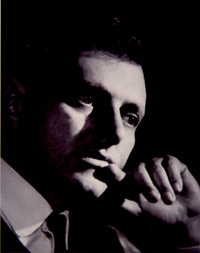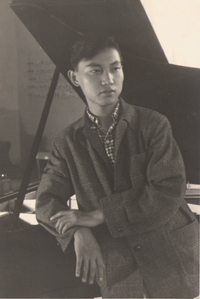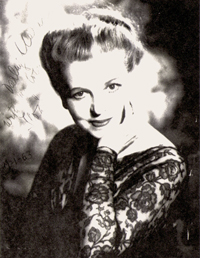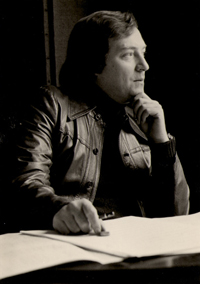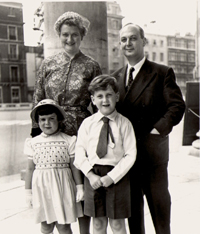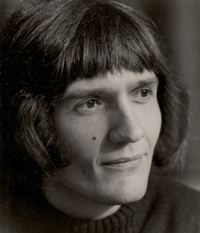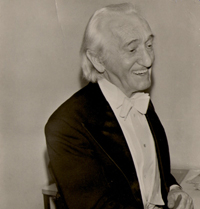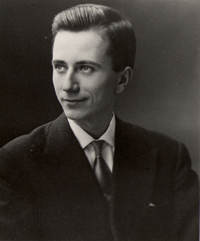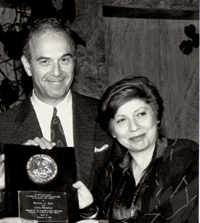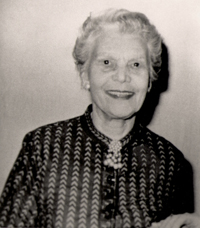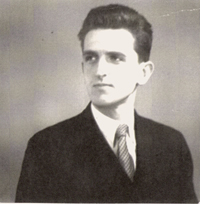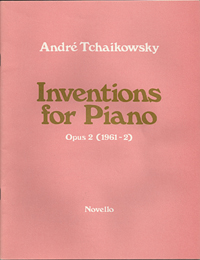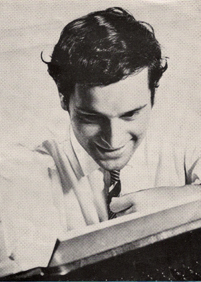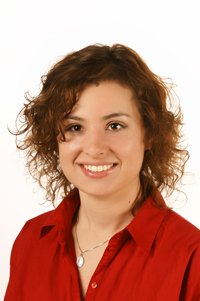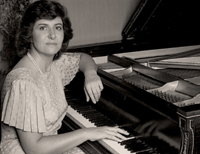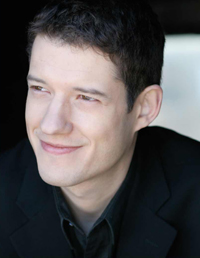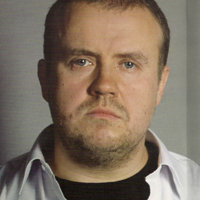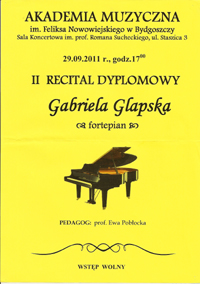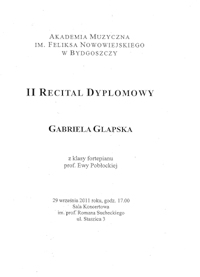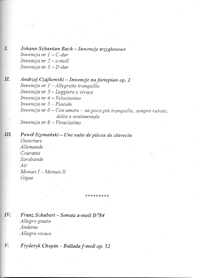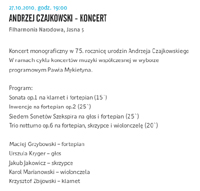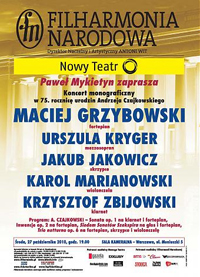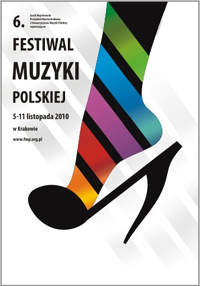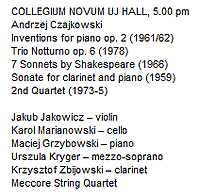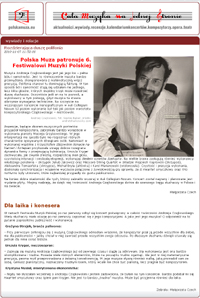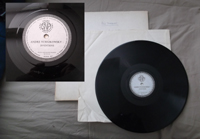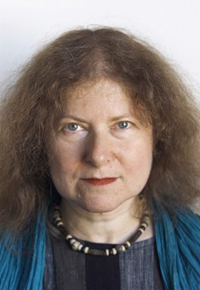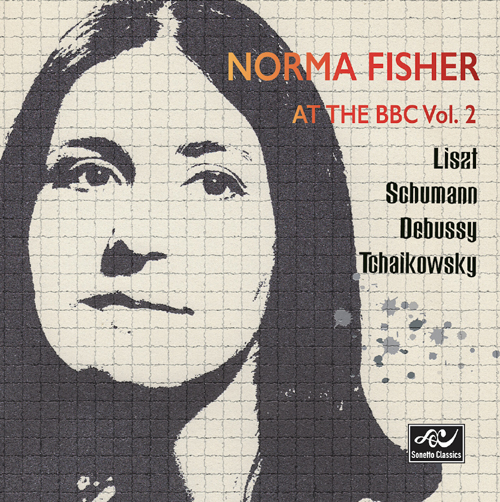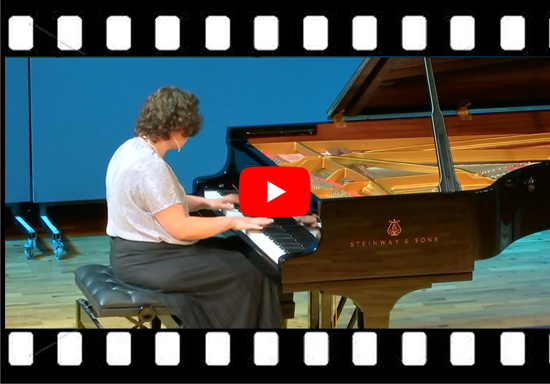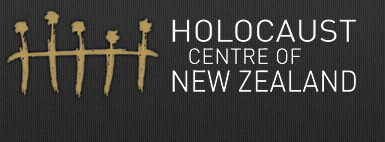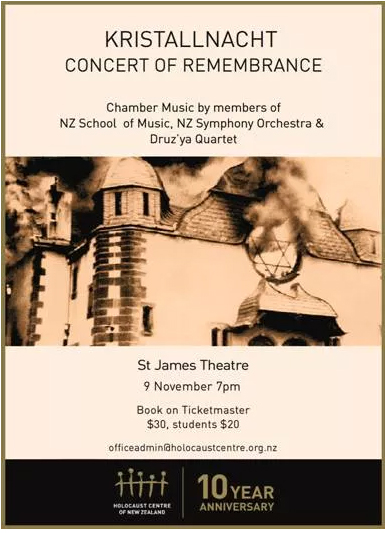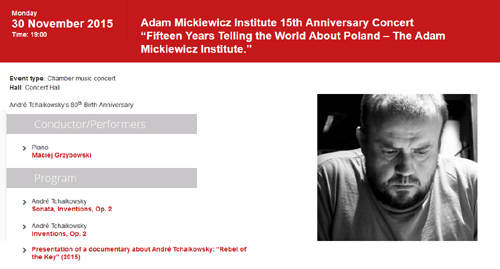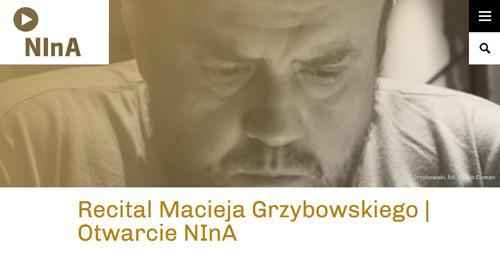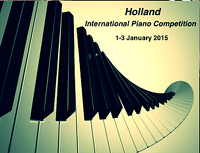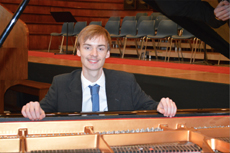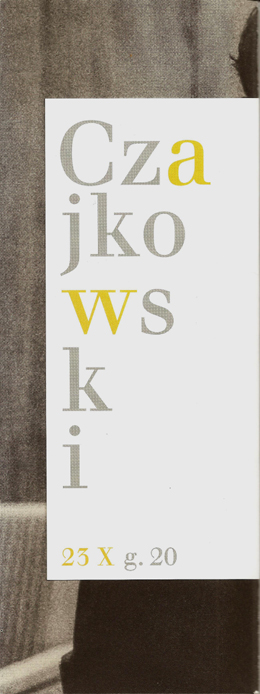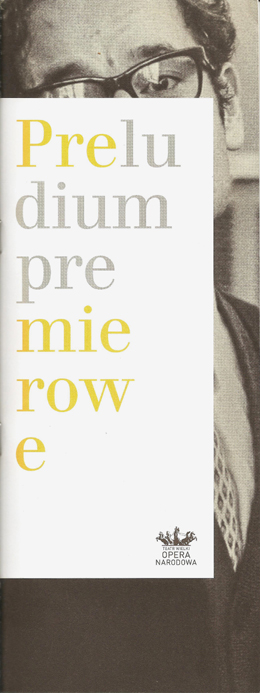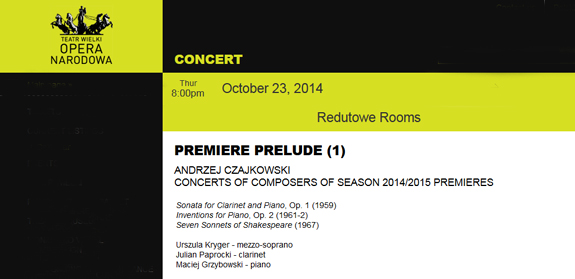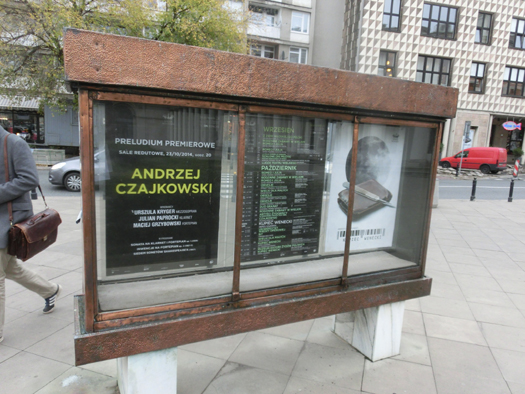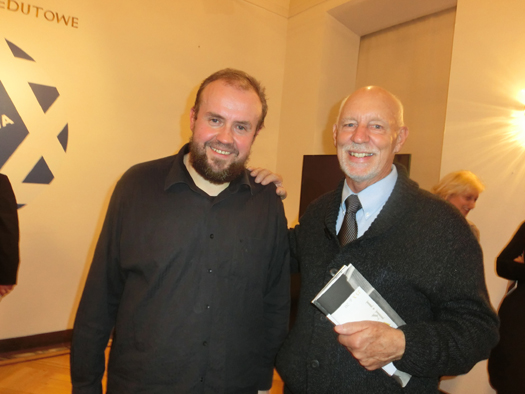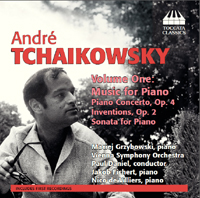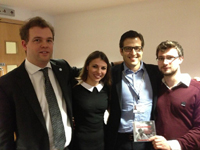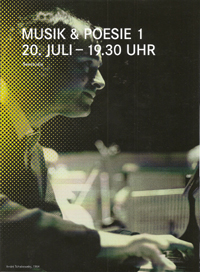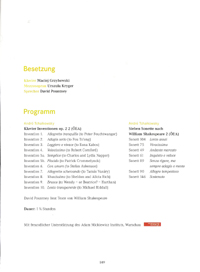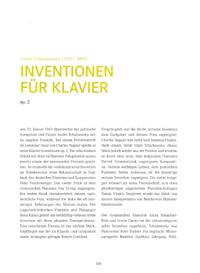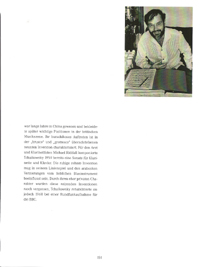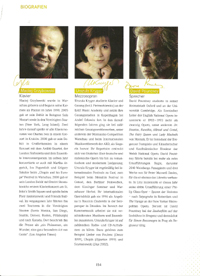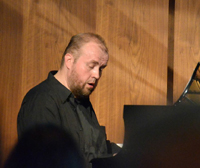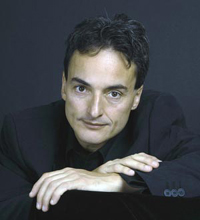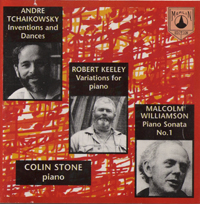|
|
| |
|
www.polskamuza.eu review by Malgorzata Czech (in Polish)
|
The
"Inventions" for Piano (1961-1963) - Opus 2 (2019
The "Inventions" Commercial Recording (Norma Fisher)
(2017)
The "Inventions" in Concert / New Zealand School of Music
Gabriela Glapska - Gabriela Glapska was born in Poland and began her piano studies at the age of seven. In 2006 she began her higher musical education under the tutelage of Professor Ewa Poblocka in Feliks Nowowiejski Academy of Music in Bydgoszcz where she graduated with the highest distinction receiving her Master’s Degree in 2011. Also, in 2011 she was selected in an academy internal competition to perform a concerto with an orchestra in the Bydgoszcz Philharmonic Hall and she gave a debut in the Pomeranian Philharmonic playing Andrzej Panufnik’s Piano Concerto. During her studies, she participated in many competitions both for solo and chamber musicians and she won many prizes. She also participated in many international music festivals and master classes conducted by prominent professors such as: Andrzej Jasinski, Ekaterina Popowa-Zydron, Aleksey Orlovetsky, Mikchail Voskresensky, Kevin Kenner, Andrzej Tatarski, Maciej Grzybowski, Monika Sikorska-Wojtacha, Martin Hughes, Waldemar Wojtal, Tomoko Mack. After graduating from the University, she worked as an accompanist in Bydgoszcz Academy of Music. Gabriela is currently pursuing the PhD degree in piano performance from Victoria University of Wellington. She has performed in Poland, Germany, Slovakia, Belarus and New Zealand. (2017)
The "Inventions" for Piano in Concert / Wellington, New Zealand
(2015)
The "Inventions" for Piano in Concert / Warsaw, Poland (2015)
Inventions in concert at the National Audiovisual Institute (2015)
Inventions No. 2 and 3 - Holland International Piano Competition (2014)
Invention No. 3 required work for a piano competition
(2014) The Inventions Performance Click Here for a PDF of the concert program (24 pages).
(2013)
Inventions Commercial Recording (Nico de Villiers)
YouTube
Music Samples (courtesy Toccata Classics) Jakob Fichert, piano Invention
No. 1 - Click
Here for YouTube (Peter Feuchtwanger) (2013)
Bregenz Festival
(2012)
Inventions Commercial Recording (Colin Stone)
Music/MP3 The André Tchaikowsky and Norma Fisher performances are from BBC broadcasts, while the Daniel Browell performance is from a Sounds Underground concert in 2005. The music you hear for André's performance came from his BBC broadcast that ended up on a Long Playing (LP) record made by Sound News Productions. I bought this LP in an eBay auction and it is thought that André made somewhere between 10 and 20 copies of this record to hand out to friends. Oddly, in the record cover, there was a letter from Judy Arnold (whose home André was living in at the time) to pianist John Ogdon. To read this letter as a pdf file, Click Here. At the time Ogdon was selecting "new" music for publication via Novello Music Publishing and perhaps this record was a factor in having The Inventions published per Ogdon's recommendation. The other side of the record features André's composition, Seven Sonnets of Shakespeare. The performance by Gabriela Glapska, a student of Ewa Poblocka, was part of her graduation requirements for an advanced degree at the Music Academy in Bydgoszcz. Her performance dates from September 29, 2011. Ms. Glapsak also did her thesis on The Inventions of André Tchaikowsky (Andrzej Czajkowski), Available Here as a PDF file (in Polish). Additional performances have taken place in Poland featuring Maciej Grzybowski. A performance of Invention 9 (09_maciej_op_2_harthan.mp3) played by Maciej Grzybowski may be found on the Polish Radio External Service broadcast "Focus - Rediscovering Czajkowski." Click on the Miscellaneous tab above for this broadcast as an MP3 file. Two performances by Grzybowski took place in October 27 (Warsaw) and November 6 (Krakow) 2010 to celebrate the 75th Anniversary of the birth of André Tchaikowsky (Andrzej Czajkowski). Of the November 6, 2010 concert, Malgorzata Czech wrote for www.polskamuza.eu:
There are two versions of Invention No. 5. Invention 5a (Napper) appears only in the original manuscript, while Invention 5b (Crommelynck) appears only in the published version. The Inventions, Opus 2 - André Tchaikowsky, piano Invention
1 - Peter Feuchtwanger / 01_andre_op_2_feuchtwanger.mp3 The Inventions, Opus 2 - Gabriela Glapska, piano Invention
1 - Peter Feuchtwanger / 01_glapska_op_2_feuchtwanger.mp3 The Inventions, Opus 2 - Norma Fisher, piano Invention
1 - Peter Feuchtwanger / 01_norma_op_2_feuchtwanger.mp3
The Inventions, Opus 2 - Colin Stone, piano Invention
1 - Peter Feuchtwanger / 01_colin_op_2_feuchtwanger.mp3 The Inventions, Opus 2 - Daniel Browell, piano Invention
1 - Peter Feuchtwanger / 01_daniel_op_2_feuchtwanger.mp3 Music
Publisher Known
Details: André was in the throes of composition in late December, 1962. A clue to all his activities surfaced in a letter to Beatrice Harthan, on December 19, 1962:
The surprise André had for Beatrice Harthan and nine other friends on January 22, 1963 was a performance of his piano suite the"Inventions." The ten Inventions were musical cameos, one for each of ten friends. Between the time of the original manuscript (1961-1962) and the published manuscript (1975), there were some changes in the dedications [Original/Published]: 1.
To Peter Feuchtwanger / To Peter Feuchtwanger Invention 1 - To Peter Feuchtwanger Peter Feuchtwanger was born in Munich, but his first musical and artistic education was in Israel. In 1951, Peter came to England and studied composition with Douglas Mews at Trinity College, where he also studied piano, percussion, and conducting. In 1954, he enrolled at the Zurich Conservatorium where he studied piano with Max Egger and composition with Paul Mueller. Peter returned to London in 1956 to study composition with Lennox Berkeley. In 1959, Peter composed "Study No.1 in the Eastern Idiom," Opus 3, which was dedicated to André Tchaikowsky (Click Here for a performance on YouTube by German pianist Henriette Gartner). Subsequently, André performed the work during a South American tour. Although Feuchtwanger started on a career as a concert pianist, he decided quite early to concentrate on composition and teaching. In the latter category, he is particularly well-known. Martha Argerich: "Peter Feuchtwanger has great experience as a teacher and to play for him has always been a great experience, his advice being extremely helpful, never arbitrary and of an incredibly high standard." Peter was André's first friend in England and was instrumental in convincing André to move his home base from Paris to London. This Invention is written in a dreamy style. Invention 2 - To Fou Ts’ong Fou Ts'ong was born in Shanghai in 1934. From an early age, he showed a great love for music. His talent was very much encouraged by his father, a highly cultured man who studied literature in Europe for many years. As a child, Fou Ts'ong studied with the Italian pianist and conductor, Mario Pad, a pupil of Sgambatti, who in turn was a pupil of Franz Liszt. Fou Ts'ong's first concert was in Shanghai in 1953, where he played Beethoven's first piano concerto. At a Bucharest piano competition in 1953, he won third prize. In 1954, he studied at the Warsaw Conservatory in Poland under Zbigniew Drzewicki, and in 1955, won third prize at the Chopin Competition. In 1958, Fou Ts'ong settled in England and became a British citizen. His repertoire covers a wide-range of composers from Scarlatti to the classical, romantic, impressionistic, and modem music. André Tchaikowsky was a friend of Fou Ts'ong and his wife Zamira. Ts'ong's marriage ended in divorce, and Zamira was dropped as a dedicatee when the Inventions were published. The right hand in this invention represents Zamira -- quiet and thoughtful -- while the left hand represents Ts'ong -- loud and abrupt. Invention 3 - To Ilona Kabos British pianist Ilona Kabos was born in Budapest in 1893 and died in London in 1973. At the Liszt Academy in Budapest, she studied with Arpad Szendy (one of Liszt's last pupils), with Leo Weiner and with Kodaly. She won the Liszt Prize in 1915. She made her debut in Budapest in 1916, toured Holland, Germany and Austria in 1918, and from 1924 traveled extensively, giving first performances of works by Bartok, Kodaly, Weiner, Dallapiccola, Roy Harris, Chavez, and Seiber. For a time she was married to the Hungarian pianist Louis Kentner, and made a home in London. Her sense of style, refinement of taste and liveliness of mind in a wide artistic sphere made her one of the most esteemed teachers in the postwar decades -- among her pupils were Peter Frankl, John Ogdon, Norma Fisher, and Joseph Kalichstein. She gave master classes in the USA and in Europe, and made regular visits to Dartington Summer School. André Tchaikowsky knew Ilona Kabos from his association with Charles Napper (Invention No. 5A). Napper, an amateur pianist, was instructed by Ilona Kabos. He established a musicians' hostel in Finchley (North London) for Ilona's students. Her student Norma Fisher became a champion of André's music. Invention 4 - To Robert Cornford Robert Cornford was born in Brazil of English parents in 1940. He spent his early childhood years there, but went to England to complete his normal education. He was admitted to the Royal College of Music where he studied composition with Bernard Stevens and Peter Racine Fricker, conducting with Richard Austin, and organ with George Thalben-Bal1 and Harold Darke. In 1960, he began his first professional work with engagements at the Bristol Old Vic Theatre and Royal Academy of Dramatic Art as musical director. In 1964, he assisted Benjamin Britten in the English Opera Group production of Curlew River. Cornford's compositions included television incidental music, film scores, and classical music, including "Variations for Piano" (1974), a composition commissioned by André Tchaikowsky and first performed in Australia by André in 1975. For many years, Cornford lived in Europe, particularly Denmark, where he was active in music arranging and conducting. Cornford died on July 17, 1983, at the age of 43. Cornford and André lived in the same house for a time. Sadly, Robert was a heavy drinker and destroyed himself through overwork and worry about financial and artistic concerns. It was one of the few situations where a friend of André's was in worse shape than André himself. This Invention is a high-speed Toccata. There is a website in tribute to Cornford: http://robertcornford.co.uk/ Invention 5a - To Charles and Lydia Napper Charles Napper was born in London in 1910. His childhood ambition was to be a pianist, but his father dissuaded him and he apprenticed as a lawyer. He opened his own solicitor's office and in the postwar boom profited with the property market. His passion for music as an amateur pianist gradually faded in favor of his studies of politics, philosophy, and religion. By 1965, he was devoting all his time to writing. He published two books on politics. He died in 1972. Lydia Napper was born in New York in 1916. She studied at Vasser, Stanford, and the London School of Economics, during which time she met Charles. She worked for the US State Department during the war, returning to England in 1947. She was an active and admired hostess in their fashionable London home and was an excellent cook. She also played the piano, was a passionate concert-goer, travelled widely, and later in life studied archeology at the University of London. She died in 1980. Charles and Lydia financed a concert series for André, lent money to André to buy a home, and supported him during his early years in England. When Charles became active in politics, André rejected the friendship and Invention 5A was replaced with 5B. However, Invention 5A reappeared in the Epilogue section of André's opera. This invention
is unpublished but is available here as image files: Invention 5b - To Patrick Crommelynck The pianist Patrick Crommelynck was born in 1942 in Brussels, Belgium. As a youth, he studied with Stefan Askenase at the Brussels Conservatory. He then went to the Tchaikovsky Conservatory in Moscow for advanced study with Victor Maerjanov, and finally, in Vienna, with Dieter Weber. While in Vienna, Patrick met a Japanese student, Taeko Kuwata, who was also in the Dieter Weber class. After graduating in 1974, Patrick and Taeko married and formed a piano team, Duo Crommelynck. Their piano duo version of Brahms' 4th Symphony was mentioned in the American Fanfare magazine as: "Amazing!" A compact disc recording of Debussy received rave notices in CD magazine. Inexplicably, Patrick and Taeko took their own lives in 1994. Patrick Crommelynck and André met at the home of Stefan Askenase in 1957 when Patrick was 15 years old. Over the years, primarily through their common friendship with Stefan, Patrick and André became friends. When it became time to publish the Inventions, André wrote number 5B for Patrick to replace number 5A. Invention 6 - To Stefan Askenase Stefan Askenase was born in Lwow, Poland, in 1896, and died in Bonn, Germany in 1985 at the age of 89. He studied in Lwow under Theodor Pollak and at the Vienna Academy of Music under Emil van Sauer. After serving in the Austrian army during the first world war, he resumed his studies with Sauer and also studied composition with Joseph Marx. He made his debut in Vienna in 1919 and his first appearance with the Warsaw Philharmonic Orchestra in 1920. He taught at a private conservatory in Cairo, 1922-25, and at the Rotterdam Conservatory, 1937-40. In 1950 he became a Belgian citizen and from 1954 to 1961 was a professor at the Brussels Conservatory. He gave master classes in Germany, Israel, and elsewhere in Europe. He was generally regarded as a Chopin specialist, in a style more expressive than brilliant, and his repertory also included the classics. He continued to concertize until his death, in 1985, after a concert at Cologne. Stefan Askenase was probably a father-figure for André. André did play for Stefan, but André was already a top-flight musician and the meetings were more between friends than teacher-pupil. André stopped visiting Stefan when Stefan's wife, Anny, became ill and difficult. She died in 1971 and André deleted her as a dedicatee. Invention 7 - To Tamas Vasary Vasary was born in 1933 in Debrecen, Hungary. He was naturalized as a Swiss citizen in 1971. Gifted with a remarkable ear, Vasary gave his first recital at the age of eight. At the Franz Liszt Academy in Budapest, he studied mainly with Josef Gat, but he was also much influenced by Kodaly, who gave him a Steinway grand piano and invited him to take over half his solfege class as soon as Vasary's studentship was ended. Having won the Franz Liszt competition in 1948, Vasary began his career as an accompanist but quickly graduated to a soloist's status. During the 1956 uprising he left for Brussels, and soon afterwards settled near Geneva, Switzerland. Much-praised recordings of Liszt made in Brussels led to debuts in Vienna, Berlin, New York, Milan, and London in 1960-1961. In London, where he eventually made his home, he was particularly warmly received. His virtuosity is delicate, his phrasing is seductive, and always at the service of a sensitive poetic imagination. Tamas Vasary and André first met at the 1955 Chopin Competition and the next year at the 1956 Queen Elisabeth Competition. This Invention was inspired by Vasary's performance of Beethoven's Hammerklavier sonata. Invention 8 - To Sheldon and Alicia Rich Alicia Schachter-Rich was born in Romania but brought up in Argentina, trained as a concert pianist, and toured Europe, South America, and the United States. Sheldon Rich was from a wealthy American family and was occupied primarily as a film maker and author. As a recitalist and soloist Alicia has performed on three continents and at festivals at Marlboro, Cracow, and Aspen. She was acclaimed in Europe as "a piano phenomenon rarely found among women" by Vienna's Die Presse, and for her "breathtaking energy and dash" by The Times. The Rich's made a major contribution to American culture when they established the Santa Fe Chamber Music Festival in 1973, an association that continued until 1991. During their association, Alicia acted as the Artististic Director and Sheldon as the Festival Director. At most festivals, Alicia was one of the performing artists. At the 1983 Festival, they programmed André Tchaikowsky's Trio Notturno (Opus 6), which was the United States premiere performance. André and the Rich's became friends, but not the closest of friends, which might be the reason this husband/wife dedication was the only one that survived the original manuscript. André always called Sheldon "Eeyore" after the Winnie the Pooh character. André was the godfather of their daughter, Jennifer (born 1968). Invention 9 - To Wendy - or Beatrice? - Harthan Beatrice Harthan was born in 1902 in England. She was trained as a musician and played the organ at her parish church. In 1925, she married a minister/missionary and moved to China. Her husband, observing her hard work with children, called her "quite a Wendy-girl." The nickname stuck and she is known as both Wendy and Beatrice. After returning from China to England, she became involved in musical groups and was a close personal friend of composer Edmund Rubbra. In the Second World War, Beatrice was a WAF Officer. She met various musicians at concerts given at the military compound, including William Pleeth. For the years 1950 to 1954, she was manager of the Amadeus Quartet, and, for 17 years, was a page turner for concerts given by pianist Hephzibah Menuhin (sister of Yehudi). In her later years, she was Secretary and Almoner of the Sheriff's and Recorder's Fund at the Central Criminal Court. She was dubbed "The Angel of Golden Lane" by Woman's Own Magazine in 1962, due to her sympathetic handling of the problems of prison wives and families. Beatrice was introduced to André by Peter Feuchtwanger. If Stefan Askenase was André's father-figure, then Beatrice was André's mother-figure. She had a drill-sergeant personality but was supportive to struggling musicians. André secretly harbored ambivalent feelings about her and the Invention is marked "Brusco" and "Grottesco." Harthan’s friendship with André ended when one day André announced, “I don’t want to see you any more, Wendy.” When Harthan asked why, André said, “Because that is what I want, and if you go to my concerts, you must not go ‘round to see me afterwards.” Invention 10 - To Michael Riddall Michael Riddall was born in England in 1938. After his normal schooling, he attended a medical college in Cambridge where he was active in amateur musical groups. Moving to London for additional medical training, Riddall formed a choir and orchestra consisting of amateur musicians who were also in the medical field. Riddall was the conductor of the ensemble. Passionately interested in music, he left the medical field and enrolled in the Royal College of Music, where he studied the clarinet. When Riddall met André Tchaikowsky in 1958, he was trying to decide whether to make his career in medicine or music. André helped Michael decide on a career in music. For the next five years, until 1963, Riddall was a clarinetist. André wrote for him a Sonata for Piano and Clarinet (1959). In 1963, Riddall decided to return to the medical profession. After his final years of medical training, he established a successful medical practice in South London. Michael Riddall acted as André's personal secretary from 1958 to 1963 and also recognized André's psychological problems and arranged for psychoanalysis with Dr. Graham Howe. Riddall also introduced André to George Lyward, who operated Finchden Manor, a home for troubled youth. Additional material below provided by and approved by Michael Riddall, from his work, "My Life Story:"
From
the biography The
Other Tchaikowsky
The Inventions were a supreme success, but like so many of André's compositions, this one, too, was put aside and almost forgotten. On June 7, 1968, André performed the Inventions on BBC, radio 3 (classical music station); it was repeated on July 22, 1971. Pianist John Ogdon, a great supporter of André, heard both the 1968 and 1971 BBC broadcasts. At the time, Ogdon was associated with the music publisher, Novello, and was selecting contemporary piano compositions for publication. Ogdon contacted André regarding the Inventions, and by 1975 they had been published by Novello as André's Opus 2. The music publisher Josef Weinberger had published André's Sonata for Clarinet and Piano, Opus I, in 1969. Weinberger may have been interested in publishing the Inventions, but André never pushed for publication of his music, never promoted performances, and warned Weinberger that neither of them would ever make a penny on his compositions. Gerald Kingsley, executive director at Josef Weinberger, remembers André:
When André was touring Sweden in March, April, 1962, he spent much of his time composing Invention No.3 instead of practicing. He wrote back to Zamira Fou:
The "Inventions" deserve a place in the piano solo repertory and now benefit from a top-notch recording by Colin Stone on Merlin Records (www.merlinclassics.com), #MRFD 20033. YouTube Inventions Invention No. 1 - Peter Feuchtwanger (played by André Tchaikowsky) Invention No. 2 - Fou Ts'ong (played by André Tchaikowsky) Invention 3 - Ilona Kabos (played by André Tchaikowsky) Invention 4 - Robert Cornford (played by André Tchaikowsky) Invention 5a - Charles and Lydia Napper (played by André Tchaikowsky) Invention 5b - Patrick Crommelynck (played by Colin Stone) Invention 6 - Stefan Askenase (played by André Tchaikowsky) Invention 7 - Tamas Vasary (played by André Tchaikowsky) Invention 8 - Sheldon and Alicia Rich (played by André Tchaikowsky) Invention 9 - Wendy-or Beatrice?-Harthan (played by André Tchaikowsky) Invention 10 - Michael Riddall (played by André Tchaikowsky)
|
||||||||||||||||||||||||||||||||||
